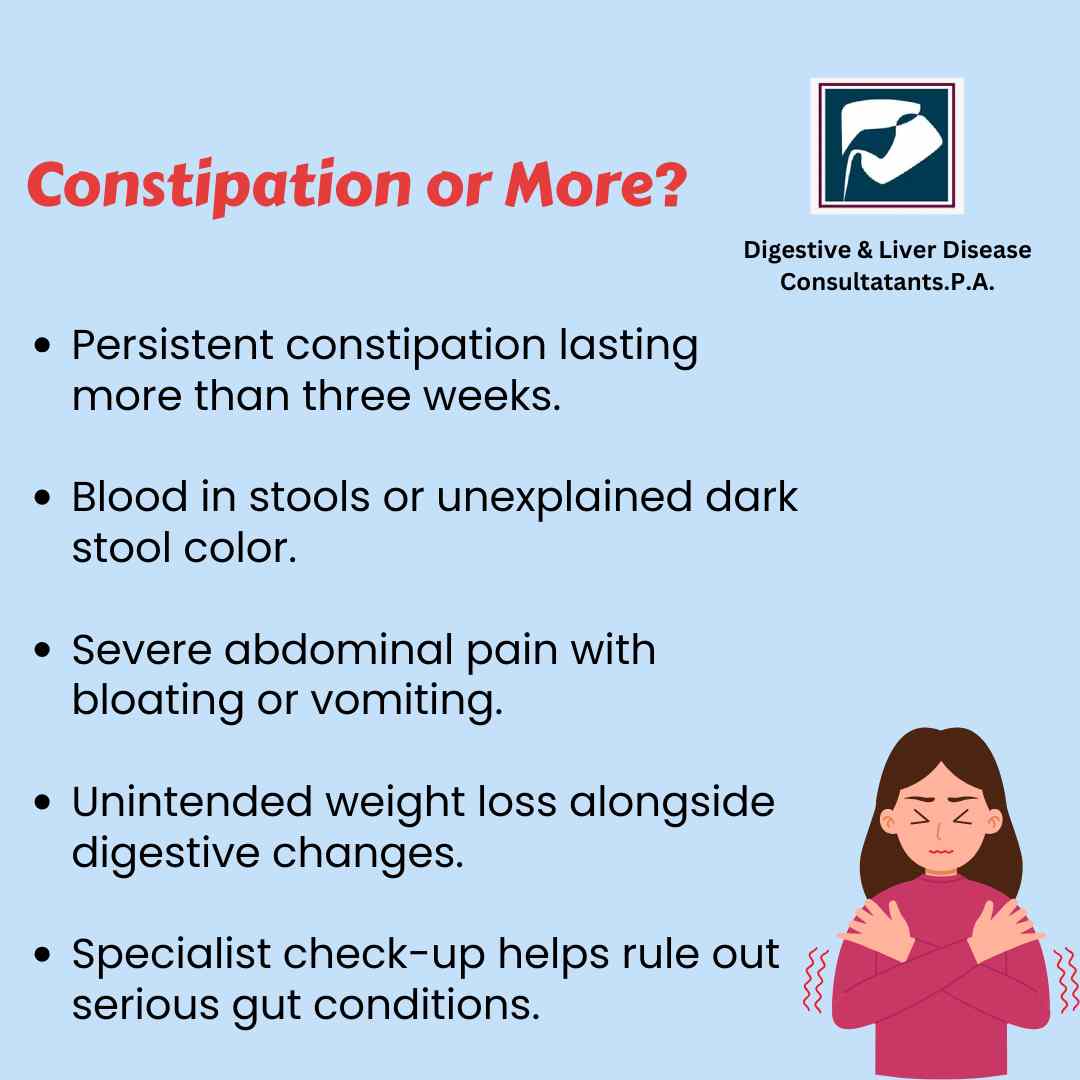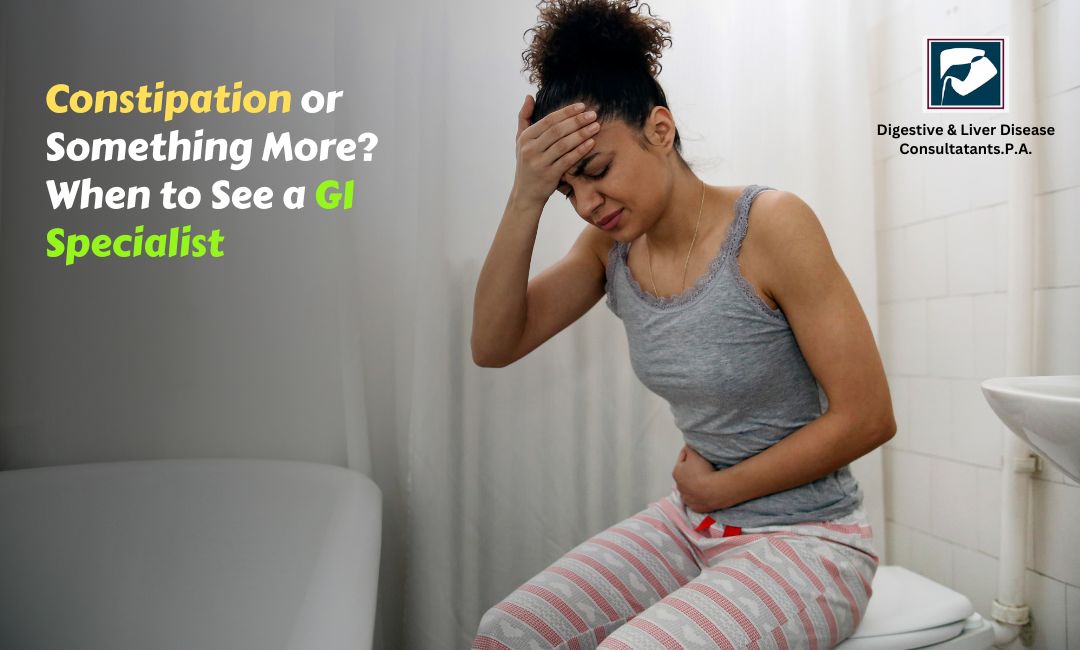Constipation is something most people experience at some point in their lives. Maybe you haven’t been able to have a bowel movement for a few days, or when you do, it’s hard and uncomfortable. While occasional constipation is usually harmless and can be fixed with some lifestyle changes, it can also be a sign of a more serious digestive condition.
Understanding the difference between temporary constipation and a problem that needs medical attention can help you protect your digestive health and avoid complications.
In this article, we’ll explain what constipation is, why it happens, when you should see a gastroenterologist, and how Digestive & Liver Disease Consultants, P.A. can help you get relief and improve your digestive wellness.
What Is Constipation?
Constipation is defined as having fewer than three bowel movements per week, difficulty passing stool, or a feeling of incomplete evacuation. The stool may be dry, hard, and painful to pass.
Occasional constipation can happen due to changes in diet, dehydration, lack of physical activity, or stress. However, when constipation becomes frequent or severe, it could be a symptom of an underlying digestive issue.

Common Causes of Constipation
Several factors can contribute to constipation, including:
Low fiber intake – Not eating enough fruits, vegetables, and whole grains can make it harder for stool to move through your intestines.
Dehydration – Without enough water, stool becomes dry and harder to pass.
Lack of exercise – Physical movement helps stimulate bowel activity.
Medications – Certain painkillers, antidepressants, and iron supplements can slow digestion.
Ignoring the urge to go – Regularly delaying bowel movements can lead to chronic constipation.
Digestive conditions – Disorders like irritable bowel syndrome (IBS), colon cancer, or anal fissures may cause persistent symptoms.
When Constipation Is More Than Just Constipation
While occasional constipation is usually harmless, some symptoms can indicate a more serious problem. Seek medical attention if you experience:
- Constipation lasting more than three weeks
- Severe abdominal pain or cramping
- Blood in your stool or black, tarry stools
- Unexplained weight loss
- Persistent bloating or nausea
- Changes in stool shape or size
- A sudden change in bowel habits, especially if you are over 50
These warning signs may point to conditions such as colorectal cancer, intestinal blockages, or inflammatory bowel disease, which require prompt evaluation by a GI specialist.
Why See a GI Specialist for Constipation?
A gastroenterologist specializes in diagnosing and treating digestive system disorders, including those affecting the stomach, intestines, liver, and pancreas.
Seeing a GI specialist can help you:
- Get an accurate diagnosis for persistent constipation
- Identify any underlying conditions early
- Receive specialized treatments, including endoscopic procedures if needed
- Learn personalized diet and lifestyle recommendations for long-term relief
Delaying care may lead to worsening symptoms or complications, so it’s important to seek help if your constipation does not improve with simple changes.
How Constipation Is Diagnosed
When you visit Digestive & Liver Disease Consultants, P.A., our gastroenterologists will start with a detailed discussion of your symptoms, medical history, and lifestyle.
Depending on your situation, we may recommend:
- Physical examination to check for abdominal tenderness or masses
- Blood tests to rule out thyroid or metabolic issues
- Colonoscopy to examine your colon for blockages, inflammation, or cancer
- Imaging tests such as X-rays or CT scans to detect structural problems
- Stool analysis to check for infections or digestive disorders
This thorough evaluation helps ensure you receive the right treatment for your unique needs.
Treatment Options for Constipation
Treatment for constipation depends on the cause. Your GI specialist may recommend:
Dietary changes – Increasing fiber intake with fruits, vegetables, whole grains, and beans.
Hydration – Drinking plenty of water throughout the day to soften stools.
Physical activity – Regular exercise to stimulate bowel function.
Medications – Using stool softeners, laxatives, or prescription drugs when necessary.
Addressing underlying conditions – Treating IBS, anal fissures, or other digestive disorders contributing to constipation.
Biofeedback therapy – Training pelvic floor muscles for those with functional constipation.
Preventing Constipation
You can take several steps to reduce your risk of constipation:
- Eat a high-fiber diet with at least 25–30 grams of fiber daily
- Drink at least 8 cups of water every day
- Stay physically active with regular walking, stretching, or exercise
- Go to the bathroom when you feel the urge — don’t delay
- Limit processed foods, dairy, and high-fat meals that can slow digestion
About Digestive & Liver Disease Consultants, P.A.
At Digestive & Liver Disease Consultants, P.A., we are committed to helping patients in the U.S. achieve better digestive health. Our team of board-certified gastroenterologists specializes in diagnosing and treating a wide range of conditions affecting the stomach, intestines, liver, pancreas, and gallbladder.
We combine advanced diagnostic technology with personalized care to deliver accurate diagnoses and effective treatments. Whether you are struggling with chronic constipation, abdominal pain, acid reflux, or liver disease, we provide compassionate, expert care tailored to your needs.
When to Seek Help
If constipation lasts more than a few days despite dietary and lifestyle changes, or if you notice blood in your stool, sudden weight loss, or severe pain, it’s time to consult a GI specialist. Early evaluation can make a big difference in detecting and treating potentially serious conditions.
Conclusion
Constipation may be common, but it should never be ignored when it becomes frequent or severe. Understanding the difference between occasional discomfort and a sign of a more serious condition can help you take action early.
If you suffer from ongoing constipation or suspect it could be a sign of something more serious, don’t wait. Schedule an appointment with Digestive & Liver Disease Consultants, P.A. today.






